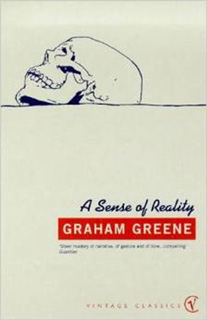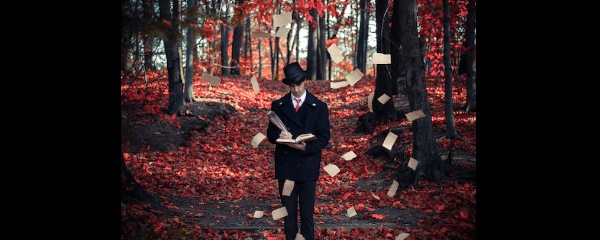
photo © Guy Huntley, 2014
by Stephen Devereux
Graham Greene is best known for his novels covering themes such as crime, colonialism, espionage and revolutions. So the collection of short stories under the title A Sense of Reality, from 1963, must have come as something of a surprise to his regular readers. It contains just four stories – none of them remotely like his novels. While all of them break new ground, ‘Under the Garden’ has more in common with Lewis Carroll or Flann O’Brien than with the ‘Englishman abroad’ genre that Greene is more usually associated with.
The story begins in recognisable Greene territory: William Wilditch, an upper-middle-class man who has travelled the world on diplomatic and security work, returns to England. Through hints and circumlocutions, doctors inform him that he has lung cancer. He comes to see his return as the journey home of a dying man. He compares himself with a mortally wounded Civil War officer who rode from a battle to visit the places and people that had been important to him. When Wilditch returns to the large house where he lived as a child, he begins to see the wounded soldier’s trip as one of ‘ridding himself of illusions’, rather than saying fond farewells.
What Wilditch has most on his mind, however, is not his old home but a dream, or the vague memory of a real boyhood experience, of finding treasure under the garden. He is not interested in its value, however, but in the way that it symbolises the imagination, the creativity that was suppressed in him as a boy by his mother. What disturbs him most is the thought that this imaginative identity will never find expression:
Now the dreaming child was dying of the same disease as the man. He was so different from the child that it was odd to think the child would not outlive him and go on to a quite different destiny.
 Wilditch’s brother George still lives in the house, but on his return Wilditch shows little interest in George’s account of debts and having to sell off land, nor is he interested in George’s children. He talks only of the ‘Dark Walk’ and the ‘lake’ to which it leads. George is bemused; the ‘lake’ is only a small pond. He questions his brother about the times that he disappeared, hiding himself in the trees on the island in the ‘lake’.
Wilditch’s brother George still lives in the house, but on his return Wilditch shows little interest in George’s account of debts and having to sell off land, nor is he interested in George’s children. He talks only of the ‘Dark Walk’ and the ‘lake’ to which it leads. George is bemused; the ‘lake’ is only a small pond. He questions his brother about the times that he disappeared, hiding himself in the trees on the island in the ‘lake’.
Wilditch sleeps in his dead mother’s room where he finds a bound volume of his old school magazines. It contains a story he had written about a boy discovering treasure on an island in a lake. The story has been angrily annotated in red by his mother, a Fabian socialist who disapproved of fantasy, myth and religion. When he reads the story written by him as a boy, it seems trite, predictable and very little like the dream or the actual adventure that he associates with the island. He cannot tell whether he has added to the contents of the dream/memory in the years since, or whether, even as a young boy, he had suppressed its disturbing content. In an attempt to rediscover the ‘truth’ of what he experienced, he decides to spend the night writing the story as he remembers it now. He must resurrect the imaginative child he had been, before the body that contains both his young and old selves destroys both of them.
His account begins with a memory, corroborated by his brother, of hiding in the Dark Walk one rainy evening. But he could not have stayed hidden for three days and three nights, which his childhood account recalls. Greene evokes that poignant mixture of memory, dream, fantasy and experience that is so often the way we in which we remember early childhood. Wilditch compels himself to think of the events he is narrating as a dream. He recalls his mother, how much she would have disapproved of his believing that his adventure was real. The reader is made aware of a contradiction – his mother believes in reality and rejects fantasy, but the son is apparently unable to separate them.
Wilditch finds a ‘cave’ between the roots of a tree on the island. He writes: ‘It’s difficult to remember that I was only seven years old.’ His attempt to convince himself that he is describing a dream is constantly eroded by such comments that place the experience in real time and space. As he crawls into the cave and along a tunnel, the practical details of making such a journey are discussed in an undreamlike fashion. Some distance in, he finds a pile of old newspapers. He picks up a copy of the ‘East Anglian Observer for April 5th 1885 – with which is incorporated the Colchester Guardian’. He remembers, also, the fishy smell of the paper. How could a seven year old’s dream contain such precise details? Why that particular date? He makes a torch by setting fire to one of the newspapers with the matches he has brought with him. Once again, the precise, practical details do not seem like the contents of a child’s dream.
Further down he hears a voice calling, ‘Is that you, Maria?’ followed by a strange quacking sound. The writing here is much darker than the surreal humour of Lewis Carol’s underground story. Wilditch writes: ‘An old woman appeared suddenly and noisily around the corner… She stood there gaping at me and then she opened her mouth and squawked.’ The voice calls out “Bring him along here, Maria” and he finds himself in the company of an old man sitting on a broken-down lavatory with a ‘white beard yellowing round the mouth’. One of the legs of his trousers is ‘sewn up and looked stuffed like a bolster’. The old man identifies himself as Javitt, which, he says, is not his real name. He explains that Maria has no roof to her mouth, hence the ‘squawking’.
Javitt mixes what he considers to be profound statements with expletives, riddles and word play. What he says has a kind of logic for the young Wilditch:
Sometimes I think that in no conversation since have I found the interest I discovered in those inconsequent sentences of his to which I listened during the days (I don’t know how many) that I spent below the garden.
Sometimes he speculates about how he could have dreamed the things that Javitt says, since he could not have known or understood them as a child. Javitt uses obscenities, or rather he uses words that the young Wilditch guesses must be obscene. Javitt talks to him as if he were an adult, discussing sex and whatever comes into his head.
In a short essay, it is difficult to do justice to Javitt’s identity. He says things like:
I shit dead stuff do I? […] Everything that comes out of me is alive, I tell you. It’s squirming around there, germs and bacilli and the like, and it goes into the ground like a womb, and it comes out somewhere.
Or:
The gorillas don’t bury their dead with hearses and crowns and flowers, thinking one day it’s going to happen to them and they better put on a show if they want one for themselves too. If one of them dies, it’s a special case, and so they can leave it in a ditch.
With his mixture of insight and absurdity and his filthy, maimed condition, his stasis, Javitt has something of Beckett’s characters about him.
The sexual references culminate in Javitt showing Wilditch a photograph of a girl in a swimsuit. It is in a magazine of the mildly titillating kind common in the 1950s. Javitt claims that she is his and Maria’s daughter. She is identified in the magazine as Miss Ramsgate. The description of her seems to be the observations of the seven year old and the adult Wilditch simultaneously:
…the particular tilt of her breasts, the shallow scoop of the navel like something carved in sand, the little trim buttocks – the dividing line swung between them close and regular like the single sweep of a pencil.
Javitt guesses that Wilditch is wondering how such gross parents could have produced a beautiful daughter:
We’ve kept our ugliness all those years and why shouldn’t she keep her beauty? Like a cat does. A cat is as beautiful the last day as the first.
Wilditch falls in love with her immediately and declares to Javitt that he will marry her. When Javitt states that Wilditch will never find her (because she has gone into the world ‘up there’), Wilditch pledges himself to searching the world for her. He wonders whether his subsequent restless journeys round the globe were not a fulfilment of that pledge.
 It is impossible for readers to determine the status of the story they are reading. Is it not far too ‘adult’, too detailed, too precisely depicted to be a dream? Can it have been a real experience, as Wilditch sometimes seems to believe? Clearly not, since we cannot accept that an aged couple lived for many years under a garden! We cannot even opt for the ‘drug induced phantasm’ theory sometimes used to explain away Alice’s Adventures in Wonderland. Nor can we put it down to a lurid fantasy written by the dying Wilditch with no connection with the past, since his first version of the story exists in the school magazine and his brother recollects him really having disappeared near the island as a boy. Greene plays with our desire for a plausible explanation, for a resolution of the mystery, but never supplies one.
It is impossible for readers to determine the status of the story they are reading. Is it not far too ‘adult’, too detailed, too precisely depicted to be a dream? Can it have been a real experience, as Wilditch sometimes seems to believe? Clearly not, since we cannot accept that an aged couple lived for many years under a garden! We cannot even opt for the ‘drug induced phantasm’ theory sometimes used to explain away Alice’s Adventures in Wonderland. Nor can we put it down to a lurid fantasy written by the dying Wilditch with no connection with the past, since his first version of the story exists in the school magazine and his brother recollects him really having disappeared near the island as a boy. Greene plays with our desire for a plausible explanation, for a resolution of the mystery, but never supplies one.
Finally, Javitt takes Wilditch further into the tunnel to where the ‘treasure’ is kept. When Javitt shows him the treasure, it consists of thousands of precious stones. The boy accepts them as real, but the adult suspects they were probably fake. But, Wilditch thinks, ‘If this was a dream, these were real stones. Absolute reality belongs to dreams and not to life’.
Eventually, Wilditch escapes by using his shoelaces to tie the sleeping Javitt’s hands together. He recalls/invents the sound of the lace end tinging on the golden chamber pot that Javitt had given him to pee in. He takes the ‘po’ with him on his escape back to the surface and thinks that he may have left it on the island at the tunnel entrance. Where, then, is the boundary between the imagined underworld and reality?
The adult Wilditch finishes his story at dawn and goes into the garden. The Dark Walk is not very dark. The ‘lake’ is so small that he is able to jump across it to the island. He finds the stump of a blackened oak tree. In front of it, he discovers a metal object almost completely buried in the soil. It is a tin chamber pot, a tiny splodge of yellow paint still visible under the handle. Wilditch sits motionless with his find. A child could have mistaken a tin ‘po’ painted yellow for a gold one. Or did he find it as a child and make up the story about it? Finding the chamber pot ‘proved nothing either way’.
Wilditch ‘had a sense that there was a decision he had to make all over again. Curiosity was growing inside him like the cancer’. Greene does not tell us what the decision is. Given Javitt’s use of the word ‘womb,’ the narrow passage Wilditch descends into and escapes from with his ‘treasure’ – the golden ‘po’ – we can, perhaps, interpret Wilditch’s night of writing (significantly in his mother’s room) as the re-birth of the creative child that his mother and his adult self had for so long tried to suppress. Its rebirth before the death of the adult is simultaneously a finding and a letting go. For the reader too, the story’s astonishing inventiveness and originality confirms our faith in the centrality of the imagination.

